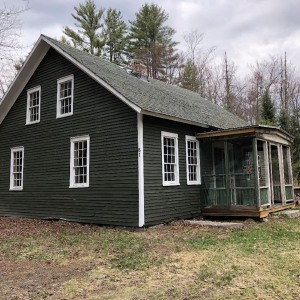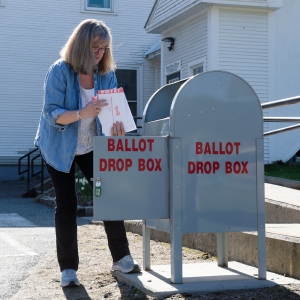‘There’s no rules or oversight’: New bill seeks to ease Vermont’s animal welfare ‘crisis’
| Published: 01-26-2024 9:12 PM |
For months, maybe even years, people had raised concerns about two horses in Randolph who looked like they were neglected and starving. Time passed on, until finally the many calls reached the right destination. Together with law enforcement, a rescue organization went up to the property last summer to find the horses, by then more skeleton than horse, miraculously still standing.
Under the care of that organization, Dorset Equine Rescue, the horses, called Thunder and Ginger, were carefully transported to a farm, where they were fed and examined by a vet. It would have been the start of a better life but, the next morning, Thunder’s organs crashed — he died of starvation.
The death, according to the founder and director of Dorset Equine Rescue, Jen Straub, was entirely preventable.
“It was just too late. His organs were already shutting down, and it’s devastating,” Straub said. “It makes you so sad and angry because if help was just there, you know, if somebody just went out a week earlier, he would not have died,” she said in an interview with VTDigger.
The horses in Randolph are just one example of many.
Earlier that summer, Dorset Equine Rescue was also involved in the seizure of more than 100 horses in Townsend. Last year, baby goats in Charlotte were dying in public view, while various organizations and agencies pointed in circles when asked who was responsible.
Advocates for change say that the state’s handling of animal abuse complaints operates in a fragmented system with no clear entity in charge. As a result, especially in a state with staffing shortages in law enforcement, cases of animal abuse often fall through the cracks.
“There’s no rules or oversight,” Straub said.
Article continues after...
Yesterday's Most Read Articles
 Dartmouth administration faces fierce criticism over protest arrests
Dartmouth administration faces fierce criticism over protest arrests
 Hanover house added to New Hampshire Register of Historic Places
Hanover house added to New Hampshire Register of Historic Places
 Sharon voters turn back proposal to renovate school
Sharon voters turn back proposal to renovate school
For almost five years, since 2019, the Animal Cruelty Investigations Advisory Board, which advises state officials on animal welfare, has been making the same recommendation: Like its neighboring states, Vermont should establish a state-level division of animal welfare. This year, it may land.
A new bill, H.626, was referred to the House Committee on Government Operations and Military Affairs last week that would create a Division of Animal Welfare under the Department of Public Safety.
“We have a fragmented system that is overwhelmed with demand,” said Rep. Katherine Sims, D-Craftsbury, one of the bill’s sponsors, in an interview.
“It’s time that we create a unified system and structure.”
Whose responsibility it is to respond to animal abuse differs depending on the case and the town in which it occurs, according to Erika Holm, the animal cruelty board’s chair.
In some towns, generally those without law enforcement, the Vermont Fish & Wildlife Department has been taking on more and more cases, Holm said.
In other places, the task falls to the town’s law enforcement or animal control officers. Neither arrangement is ideal, according to animal welfare experts such as Holm, because the former is often too busy while the latter can be unequipped to handle such cases.
“Untrained animal control officers in towns, they are trying to do an investigation because they took a phone call from a concerned neighbor,” Holm said in an interview. “They may not even have the most basic cruelty investigation training that has been offered,”
With such a fragmented system, it is difficult to even determine how large the scale of animal abuse is in Vermont, as no one agency collects data of people reporting abuse.
Holm is also the director of the Central Vermont Humane Society, a rescue organization that, like Dorset Equine Rescue, often assists law enforcement in animal cruelty investigations.
According to Holm, Vermont’s animal welfare is reaching a crisis point, as the state increasingly relies on nonprofits that often do not have the capacity to house animals, which can be seized indefinitely during court cases. “We don’t have the resources, nor do we have the space,” she added.
“No longer is there an animal cruelty investigation involving six dogs. It involves 25 dogs or 90 dogs and no shelter,” Holm went on. “No one organization has the capacity for that, and the state is really the level that this needs to be handled at.”
If passed, the new animal welfare division would launch on July 1 and a director of animal welfare would be appointed by the public safety commissioner, creating a clear point of contact for Vermonters who want to report animal abuse. That person would be charged with supervising investigations of abuse complaints.
“It’s frustrating when people try to get in touch with someone when it seems like there’s an emergency or an urgent situation, which there often is with animals. It’s frustrating for people to not have somewhere to go,” said Rep. Chea Waters Evans, D-Charlotte, another bill sponsor, in an interview. “A lot of times it is just a pure lack of knowledge (of) what to do next.”
If the new bill were to pass, the state would still rely on rescue organizations, although to a lesser extent, and it would create an animal welfare fund to, among other things, compensate them for some expenses.
Many organizations currently rely solely on donations.
As envisioned by the bill, the new division would not only be a point of contact but would also function as a form of oversight to further prevent animal abuse. For example, the division would make sure animal shelters are licensed, something that is currently not a mandatory requirement.
Several animal welfare experts, including Straub and Holm, expressed enthusiasm when asked about the bill.
“Not only did they write a bill but (they) actually included some of our suggestions, and that meant a lot to our organization. It made us feel very heard,” Straub said.

 Students take down pro-Palestinian encampment at UVM
Students take down pro-Palestinian encampment at UVM
